Absence
🔊 US Loading... 🔊 UK Loading...The word “absence” refers to the state of being away from a place, situation, or person, or the lack of something that is typically present or expected. It is commonly used to describe the nonexistence or unavailability of something or someone in various contexts. Below is an in-depth look at its meaning, definitions, and usage.
Definition of “Absence”
- General Meaning:
- The state of being away or not present.
- Example: Her absence from the meeting was noticed.
- Lack or Nonexistence:
- The state of something being missing or unavailable.
- Example: The absence of evidence made the case difficult to prove.
Detailed Meanings and Uses of “Absence”
1. Physical Absence
- Refers to the condition of a person or thing not being physically present in a specific place or situation.
- Example: His absence from school was due to illness.
- Example: There was a noticeable absence of leadership in the team.
2. Lack or Deficiency
- Indicates the nonexistence of a quality, feature, or element that is usually present or expected.
- Example: The absence of light made the room pitch dark.
- Example: An absence of trust can ruin relationships.
3. State of Mind
- Can describe a lack of focus, attention, or awareness.
- Example: Her absence of mind led her to miss the train.
Synonyms for “Absence”
- Nonattendance
- Unavailability
- Vacancy
- Lack
- Shortage
- Deficiency
- Void
Antonyms for “Absence”
- Presence
- Availability
- Attendance
- Existence
Examples of “Absence” in Sentences
- Physical Absence:
- The absence of the teacher caused confusion among the students.
- Her absence at the event was deeply felt by everyone.
- Lack or Deficiency:
- The absence of communication led to misunderstandings.
- The absence of proper equipment slowed down the construction project.
- State of Mind:
- In her absence of mind, she left the keys in the car.
Common Phrases and Idioms Using “Absence”
- Absence makes the heart grow fonder:
- Meaning: Being away from someone or something increases one’s affection for it.
- Example: They’ve been apart for weeks, but absence makes the heart grow fonder.
- In someone’s absence:
- Meaning: Refers to actions taken when a person is not present.
- Example: In his absence, the assistant handled the meeting.
- Conspicuous by its absence:
- Meaning: Something notable for not being present when it was expected.
- Example: Her name was conspicuous by its absence from the guest list.
Differences Between “Absence” and Related Words
- Absence vs. Lack:
- Absence often implies that something or someone was expected to be there but is not, while lack focuses on the insufficiency or inadequacy of something.
- Example (Absence): The absence of rain caused the crops to dry out.
- Example (Lack): The lack of resources delayed the project.
- Absence vs. Unavailability:
- Absence refers to not being present, while unavailability suggests something exists but is not accessible at a given moment.
- Example (Absence): Her absence from work was unexpected.
- Example (Unavailability): The unavailability of the book disappointed readers.
Conclusion
The word “absence” is essential in describing situations where something or someone expected is not present or available. It can be used in physical, emotional, or conceptual contexts to indicate a gap, void, or lack. Mastering its usage allows for more precise communication in various scenarios, whether in writing, conversation, or formal discussions.
Relative words of ‘A’
| S.No | Words |
|---|---|
| 1 | A |
| 2 | Able |
| 3 | Ability |
| 4 | About |
| 5 | Above |
| 6 | Absence |
| 7 | Abroad |
| 8 | Absolute |
| 9 | Absent |
| 10 | Abstract |
| 11 | Abuse |
| 12 | Angry |
| 13 | Access |
| 14 | Annoy |
| 15 | Acceptable |
| 16 | Acceptance |
| 17 | Accede |
| 18 | Accept |
| 19 | Abusive |
| 20 | Academic |
| 21 | Approve |
Additional Insights

Parallel Axis Theorem – Definition, Formula, Derivation & Applications

Axis of Symmetry: Definition, Equation, and Real-Life Applications

X and Y Axis: Definitions, Graphs and Examples
Coconut Spanish Translation

Cashew Spanish Translation
Axis Definition and Meaning

Walnut in Spanish Translation

Almond in Spanish – Translation and Meaning
